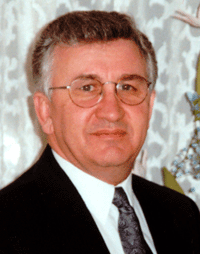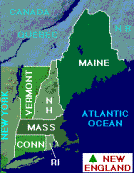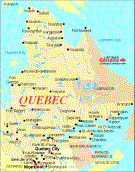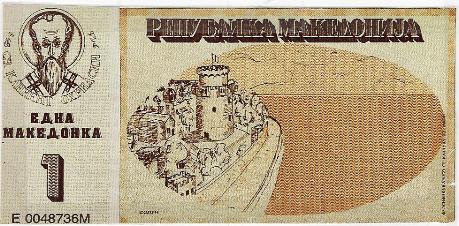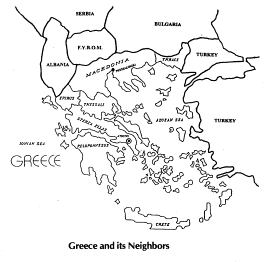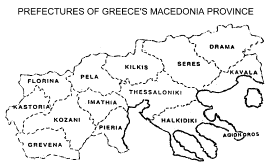
|
What's In A Name? By Bill Gatzoulis With historical assistance from Marcus Templar |
||||||
Now, what happens if one area of our world started calling itself with the same name as a neighboring area? What if this area also took the identity and history of its neighbors? What if this first area becomes a country? Can it now decide to call itself with the same name as its neighbor and the rest of the world recognizes it so? The Massachusetts Bay Colony consisted of the area of the northern New England states and also encompassed part of what today is the Canadian province of Quebec. Throughout the years, many Quebec inhabitants have migrated from Quebec to the New England states. If Quebec broke away from Canada and became an independent country, would it be suitable to change its name to "New England"? Would it bother anyone if this "New England" hoisted a new flag with New Hampshire's Old Man of the Mountain in the middle of it, printed new currency picturing Bunker Hill on it, redrew their maps such that their territory is shown going all the way down to Boston and beyond, and revised their history books to indicate the colonial New England history as their own. Maybe we can call this new country "New New England" and we can rename the Northeastern part of the United States "Old New England". Will that make it clear to everybody?
In September of 1991 this republic declared independence from Yugoslavia and it named itself "Republic of Macedonia" as a new independent country. They designed a new flag with the Sun of Vergina at its center and printed new currency with the White Tower of Thessaloniki, symbols clearly from the northern province of Greece. Because of these actions and also because of certain articles in their constitution which implied that the their country had territorial rights to all of the ancient Macedonian area, Greece imposed a trade embargo and prevented any trade commerce through Greece's northern border. Greece reluctantly lifted the trade embargo when The FYROM redesigned and accepted a new flag, stopped the issuance of the new currency with the depiction of the White Tower of Thessaloniki, and passed amended articles to their constitution implying that they have no territorial rights outside their present boundaries. Greece, however, continued to object to their use of the name Macedonia. Because of this objection, the United Nations accepted this nation as a new member with the temporary name of "The Former Yugoslav Republic Of Macedonia (The FYROM)" (UN Resolutions #817 of April 7 and #845 of June 18 of 1993) until a permanent solution to the name is found. To this date no solution has been found and the UN deadline of September 13, 2002 has passed by with the two countries only agreeing to extend discussions on this matter for one more year.
The deliberate and systematic campaign of distortion, stealing and absorption of the history and ethnicity of the ancient Macedonians is ongoing today with full and untiring strength. Although officially this country is known as The FYROM, through a vigorous campaign they have managed to contrive the world to call it Macedonia in common day usage. The Internet and mass-communication has made it easy for them to do this and they have used these tools to create a flood of misinformation. One such example that clearly shows their devious actions is the Web site: http://faq.macedonia.org/. Hitler is credited with saying "Tell a big enough lie, tell it often enough, and it becomes the truth". In some way this provides an explanation as to why the inhabitants of The FYROM are so adamant about keeping the name Macedonia. Now, fifty-eight years after the start of the campaign of distortion, stealing and absorption of the GREEK history and ethnicity of the ancient Macedonians, we find that the inhabitants of The FYROM are mostly the children of 1944 and those that were born afterwards and who grew up with these untruths. To them these have become facts. But, must this go on any longer? Isn't it time to set the record straight?
Macedonian = GREEK for "the tall one" Amyntas (father of Philip) = GREEK for "defender" Philippos (Philip) = GREEK for "one who loves the horse" Alexandros (Alexander) = GREEK for "the protector of man" Bucephalus (Alexander's beloved horse with a large head)= GREEK for "ox-like head " Aristotle (Alexander's teacher) = GREEK for "the best and perfect one" Thessaloniki = GREEK for "victory over the Thessalians" Countless historians and other scholars have written extensively about the Greekness of Macedonia. Henry Morgenthau served in Constantinople as US Ambassador (1913-16), served as Vice President of the Relief Committee for the Middle East (1919-21). He was appointed by the League of Nations and served as President of the Greek Refugee Settlement Committee (1923-28) and is known as a most reliable source of historical facts. In 1929 (please note that this was 15 years before the start of the campaign of distortion, stealing and absorption of the Greek history and ethnicity of the ancient Macedonians by Tito’s propagandists) Henry Morgenthau published his book I was sent to Athens, in which he writes:
"The imagination of these conquered peoples was dazzled by the introduction of Greek art, literature, philosophy, and public works. Though the successors of Alexander were unable to maintain the political control of the lands he conquered, and though successive waves of Roman, Arabian, and Tartar conquests swept over these lands in succeeding centuries, none of the later conquerors has been able wholly to eradicate the influence of Greek culture, nor to exterminate that element of population which was of Greek blood. "….The Greek War of Independence, which came to a successful conclusion in 1832, affected less than one half of the Greeks in the Turkish Empire. It did not bring freedom to the Greeks of Macedonia and Thrace, of Crete and the Aegean Islands, nor to the more than two million Greeks in Asia Minor and Constantinople." If the entire region of The FYROM were from ancient Macedonia they would have some legitimate claim for The FYROM to be called Macedonia. But it is not. Over 90% of the ancient Macedonian area is outside of The FYROM's borders and less than 1/5 of its own land within its borders is from the ancient Macedonian area. The FYROM is clearly mostly a Slavic region. If a vast majority of the inhabitants in The FYROM were Greeks, they would have some legitimate claim to have this country named Macedonia. But they are not. The Greek inhabitants in The FYROM are a small minority. So where does their claim for The FYROM to be called Macedonia in any form comes from? There is no valid reason, which is based on truth for this country to have any form of a name that contains "Macedonia" in it. Presently, internal strife between the various minorities within The FYROM, has placed the country on the verge of collapse. Albania (since about 1/4 of The FYROM territory is ethnically Albanian) and Bulgaria are anxiously waiting on the sidelines for this to happen to quickly rush in and grab a piece of it. On the other hand, Greece maintains a position of a staunch supporter for the survival of this country. Isn't it ironic that The FYROM continues to slap Greece, its one and only friend of the region, in the face with the "Macedonian Name Issue"? I would think, though, that changing their name back to "VARDARSKA" such as "VARDARSKA REPUBLIKA " or "REPUBLIKA VARDAR" would serve as a unifying force for the various factions within its borders, would eliminate the name controversy with its neighbors, and would put them on the road to their proper identity, ethnicity, heritage and most of all dignity. |
||||||
Bill Gatzoulis (billgatz@attbi.com) was born in Pentalofos of the Kozani prefecture in the Macedonia Province of Greece and came to the United States in 1955. He graduated in 1968 from the University of New Hampshire and is now a retired Electrical Engineer from the US Department of the Navy. He has served on the Parish Council of the Annunciation Greek Orthodox Church in Dover NH, as President of Thesseum Chapter #248 of The Order of AHEPA, and as President of the Pentalofos Society. He is presently President of The Hellenic Society Paideia of New Hampshire which aims to preserve and promote the Hellenic heritage, history, language, art, culture, and religion in New Hampshire (http://paideianh.home.attbi.com/). Marcus Alexander Templar was born in Thessaloniki, the Capital of the Greek Province of Macedonia. He received his BA from Western Illinois University with major in Social Sciences and Humanities and his MA from Northeastern Illinois University in Human Resource Development. He is an established expert on the Balkans and a Slavicist specializing in the History, People and Language of the South Slavs (The FYROM) and the Bulgarians. Besides Greek and English, he speaks Serbocroatian, Bulgarian, and the Slavonic language of The FYROM. He has authored articles and essays on historical and social issues regarding the Slavs of the FYROM as well as the former Yugoslavia and Bulgaria. He is former President of the Macedonian Society of Greater Chicago, and an advisor to the Pan-Macedonian Association of the USA Committees of National Issues and Strategic Planning. |

|
2000 © Hellenic Communication Service, L.L.C. All Rights Reserved.
http://www.HellenicComServe.com |
